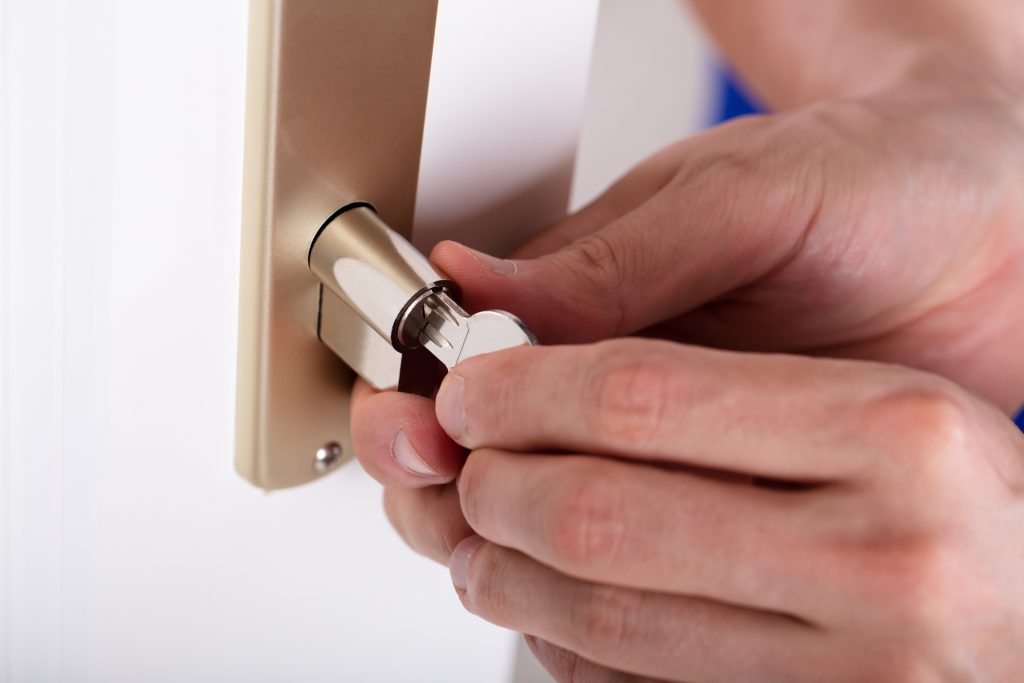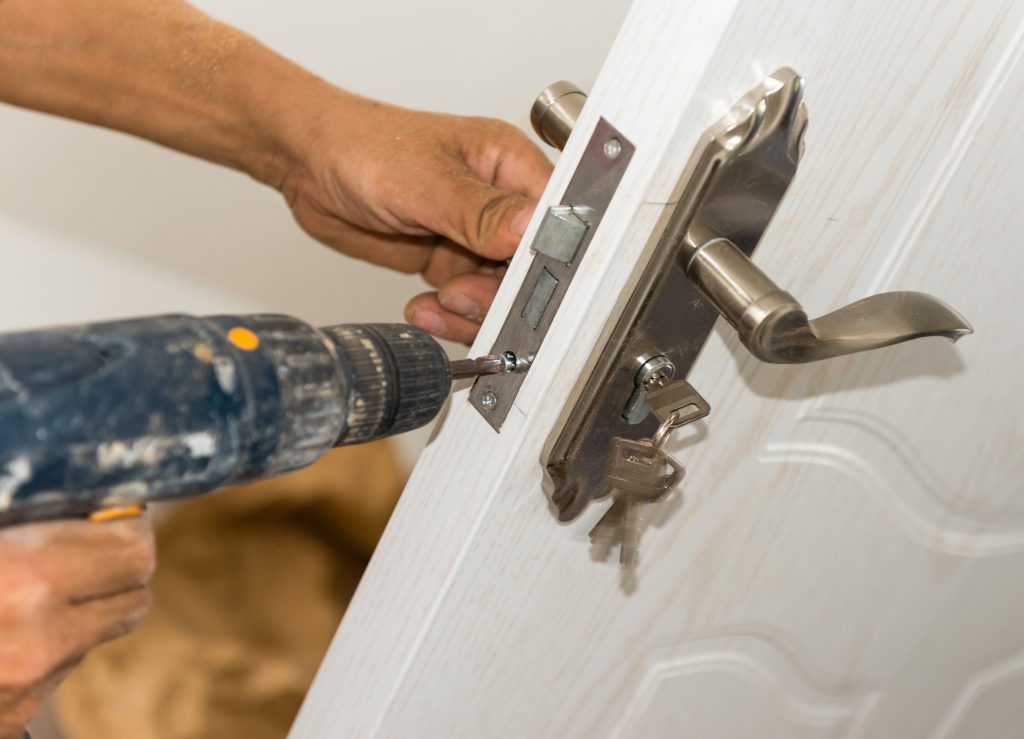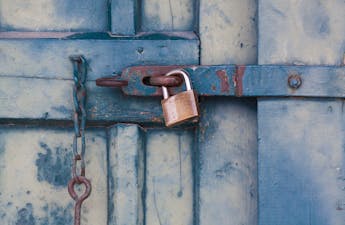As landlords, we try to manage our expenses as much as we can to best run our businesses. However, it’s important to balance costs with legal requirements and our duty to provide safe habitability to residents. When a tenant moves out and a new one moves in, it may be tempting to simply collect the keys from the old one and pass them on to the new. After all, you have just completed the tenant selection process and would like to get your renters into the apartment as quickly as possible. But do landlords have to change locks between tenants? Should we?
In this article we will discuss what your responsibilities are as a landlord and what options you have available to address the security concerns of your tenants as well as efficiently manage your properties.
Do Landlords Have To Change The Locks Between Tenants?
Generally speaking, responsibilities vary from state to state. In most states there are no rules regulating this decision, though there are some local ordinances and laws that may require you to do so. For example, in cases of domestic violence, some jurisdictions place a legal duty upon landlords to change or re-key locks. At the very least, most states require the landlord to provide a functioning deadbolt on all exterior doors to the unit. If it has been damaged, then you may be required to replace it for the new tenant.
So while there is no legal requirement for a landlord having to change locks between tenants, that doesn’t mean it’s not something you should consider doing anyway.
Is It Worth The Cost To Change Locks Between Tenants?
Most landlords look at the cost of changing the locks, and they can feel their wallets getting lighter. However, it is important to consider things from the other side of the coin, as well.
When a tenant signs a rental agreement, they expect safety and security. Perhaps multiple former tenants made copies to give to family or friends and never turned those over. If there are a dozen copies of the key floating around, it’s hardly an ideal situation to find yourself in. If the keys or lock are old, it can also undermine the confidence a renter has in the property. When a renter doesn’t feel secure, it often means they keep looking for a better place to move to instead of settling in and becoming a regular tenant.
Worse, not changing the locks could be like not fixing that tricky stair. On one hand, it’s not that big of a deal. If people know to avoid it then it shouldn’t be a problem. But if something does happen it’s going to cause a lot of headaches, and someone could get hurt. If someone has a key from a former tenant, they could break in and steal something. An abusive ex could use a key stolen from their time as a resident or neighbor to cause serious problems. In Oregon cases of domestic violence impose a legal requirement on the landlord to change the locks.
At the end of the day, changing the locks between tenants is often a smart, solid investment. It will make your life easier, your properties more valuable, and your tenants that much happier.
![]() Also Read: Apartment Security Systems – How They Work, What to Look For, and More
Also Read: Apartment Security Systems – How They Work, What to Look For, and More
What Solutions Do You Have Available?
With all of that being said, it’s important to remember that as the landlord you have a lot of options available to you for making sure each tenant has a unique lock to keep themselves safe. Some of those options include:
#1: A New Deadbolt and Knob Set
You need to take the old mechanism out of the door and replace it with new ones if you’re going to replace the locks entirely. This is probably the safest route to go. If you don’t have the skills to get this job done, you’re going to have to call a locksmith. All it takes is a few tenants not staying for the full length of their lease before this starts to get really expensive. Generally, this should only be your option if the lock is damaged and truly needs to be replaced to function.
If you have the ability to do this yourself, you can find numerous different options at your local hardware store.
Auto Amazon Links: No products found.
#2: Re-Key The Existing Locks

An alternative to the landlord changing locks between tenants is to re-key the locks that already exist on the unit. To do this, you remove the lock from the door and open it up to reveal the pins. The pins are then changed for new ones, creating a new configuration that requires a new key to open. This is less expensive than buying entirely new locks, generally speaking. However, it still requires the aid of a locksmith in most cases. If a property has multiple doors it can get quite time-consuming. In addition, it’s a logistical nightmare keeping track of all the old keys versus the new keys. But, it allows the existing mechanisms to remain in place. This is a huge save if the locks themselves are still strong and functional.
![]() Need maintenance help? See our recommendations for The Best Property Management Software for Managing Maintenance on Rental Property.
Need maintenance help? See our recommendations for The Best Property Management Software for Managing Maintenance on Rental Property.
#3: Switch to Smart Key Products
Smart key locks are specifically designed so that you can re-key your own locks in minutes. All you need to do is follow a few simple steps. You simply take the existing key, and push it into the lock, before turning it 90 degrees to set that code in place. You insert the smart key tool into its slot, then remove both the old key and the smart key tool. Push the new key in, turn it back 180 degrees, and then return it to the upright, starting position. This allows the pins to reset to the new key on their own, letting the technology do the work for you.
This option is good for landlords who find themselves wishing they could re-key their doors cheaply and efficiently. However, it is more expensive than a traditional lock, so the up-front cost is something that you need to figure for your security budget.
#4: Electronic Locks
Perhaps the easiest way to avoid the problems of keys is to avoid using keys at all! Electronic locks with number pads and codes might seem like something only used in sci-fi novels and spy movies, but they’re growing more and more common.
While they are more expensive to install up-front, they run on batteries, and they may require the expertise of a locksmith, there’s no cost to change the code. Even better, the code allows maintenance workers and others to come in and do their jobs without needing the tenant to be present, or a physical key to get in. These systems are also ideal for common areas like mail rooms, laundry, etc. where all tenants can use the same code to get in. And when it comes time to change residents, you just need to delete the old code from the system. However, while not likely, it is possible for these locks to be hacked or cracked by technologically proficient thieves.
Auto Amazon Links: No products found.
#5: Smart Locks
As homes get smarter, we have more ways to computerize our locks. Smart locks are those with Wi-Fi capabilities that can be unlocked from a smartphone or other app. This is hugely convenient for tenants, as the door could be unlocked remotely by the landlord without the need to call a locksmith, and the code can be changed with relative ease. They can even be synced to smart products like Alexa, or Google smart devices. The difficulty with these locks will be adjusting to the programs they use, and keeping them safe from people who shouldn’t have access. While they are definitely more convenient, they can also be easier to hack with malware and password crackers, allowing those who shouldn’t have access to walk into a property.
Auto Amazon Links: No products found.
#6: Video Intercom and Access Control
For larger apartment or condo buildings and complexes, changing and managing keys and codes will be too much for many landlords. Providing access for package delivery has now become a required amenity for residents yet creates a potential threat to building security.
Property owners and managers should turn to smart building technology, including video intercom and smart access control for their rental properties. Swiftlane provides a cloud-based, smart building access solution that elevates the resident experience, reduces operational burden for property managers, and maximizes NOI for building owners. Book a demo and see how this could work for you.
#7: Hybrid Property Management
Finally, if you are would rather have a property manager be responsible for securing access into your rentals, but don’t want to pay the costly property management fees, Marble may be a good solution for you.
For a reasonable flat fee, Marble fills vacancies, executes leases, coordinates maintenance, and facilitates electronic rent collection. As part of their onboarding, they will coordinate the installation of bluetooth-enabled smart locks for each of your units.
- Marble presents a happy medium between DIY management and hiring a professional property manager. For a reasonable flat fee Marble fills vacancies, executes leases, coordinates maintenance, and facilitates electronic rent collection.
- Strength: Hybrid Full-Service Mgmt
![]() Also Read: Trends In Property Management Technology for 2021
Also Read: Trends In Property Management Technology for 2021
The Choice is Yours!
As a landlord, you have lots of different lock options for your properties. We believe modern electronic and smart locks are often the best in terms of safety, and long-term security. If you have one of these solutions, the question of whether landlords have to change locks between tenants is irrelevant. Whether you buy from your local hardware store, or order from your computer, you can acquire them quickly and easily whichever choice you make! Just remember to coordinate your schedule with your tenants so there’s minimal disruption when it comes to updating your locks.
Disclosure: Some of the links in this post are affiliate links and Landlord Gurus may earn a commission. Our mission remains to provide valuable resources and information that helps landlords manage their rental properties efficiently and profitably. We link to these companies and their products because of their quality, not because of the commission.







Thank you for explaining that it might be a good idea to change locks between tenants. My sister just bought a condo and plans to rent it out. It seems like this could be something to keep in mind so she can plan for the expense whenever the tenants move.